For my father, Rodgers Lee WinterJ.W. For Jean Stauffer with loveK.B.R.
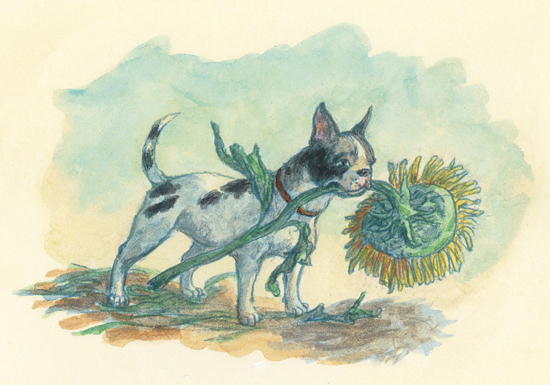
Text copyright 2011 by Jonah Winter
Illustrations copyright 2011 by Kimberly Bulcken Root
All rights reserved. Published in the United States by Schwartz & Wade Books, an imprint of Random House Childrens Books, a division of Random House, Inc., New York.
Schwartz & Wade Books and the colophon are trademarks of Random House, Inc.
Visit us on the Web! www.randomhouse.com/kids
Educators and librarians, for a variety of teaching tools, visit us at www.randomhouse.com/teachers
Library of Congress Cataloging-in-Publication Data Winter, Jonah. Born and bred in the Great Depression / Jonah Winter ;
illustrated by Kimberly Root.1st ed.p. cm.
Summary: A boy remembers his fathers stories about life in East Texas during the Great Depression.
eISBN: 978-0-375-98385-6
1.
Depressions1929Texas, EastJuvenile literature. 2. Texas, EastHistory20th centuryJuvenile literature. 3. Texas, EastSocial conditions20th centuryJuvenile literature. I.
Root, Kimberly Bulcken, ill. II. Title.F391.W73 2011976.4062dc222009048809 The illustrations were rendered on Arches 140 hot-press watercolor paper using
drawing pencils, ink, and watercolor. Random House Childrens Books supports the First Amendment and celebrates the right to read. v3.1
Contents
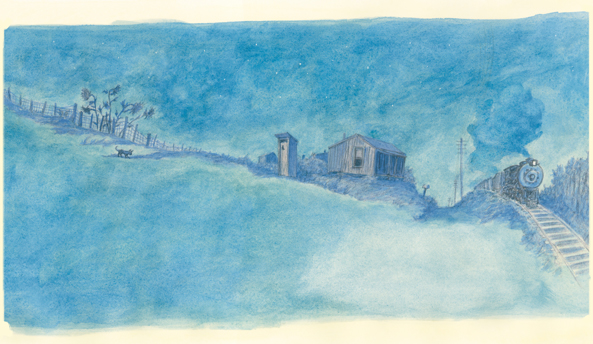
Where you grew up, on the edge of town, next to the tracks, you could hear the trains going by at night.
East Texas, the 1930s the Great Depression.
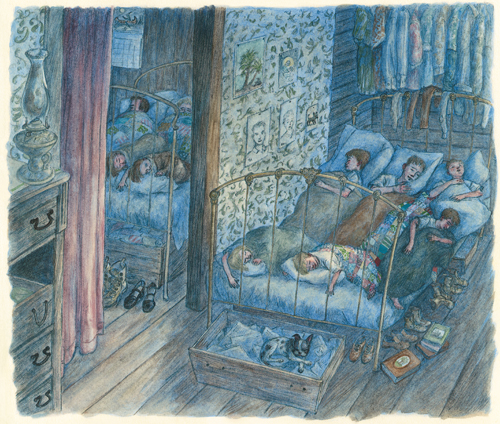
In that tiny white frame house, there were ten of you eight kids and your parentsin four small rooms.
You slept at the foot of one bed because there were only two beds and you were the youngest.
You had to read by kerosene lanterns because you couldnt afford electricity. 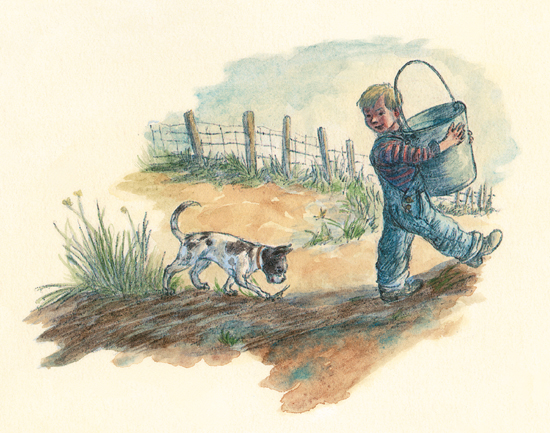 You got your water from a well because there was no indoor plumbing. There were no toilets, so you had to use an outhouse.
You got your water from a well because there was no indoor plumbing. There were no toilets, so you had to use an outhouse.
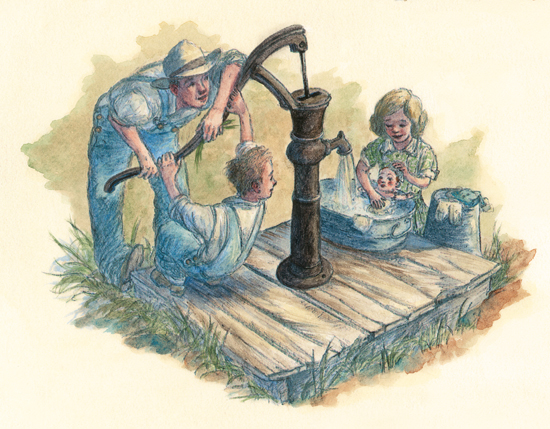 I know, because youve told me, Dad. This was the world you grew up in.
I know, because youve told me, Dad. This was the world you grew up in. 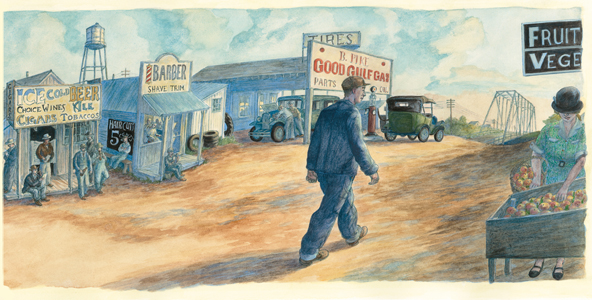 There werent any jobs, or not many, and sometimes your dad, Grandpa Winter, couldnt find work. Hed make the slow walk home empty-handed, past the storefronts, over the bridge, all the way to the edge of town
There werent any jobs, or not many, and sometimes your dad, Grandpa Winter, couldnt find work. Hed make the slow walk home empty-handed, past the storefronts, over the bridge, all the way to the edge of town
where the poorest people lived.
Waiting for him there were nine mouths to feed with no money. 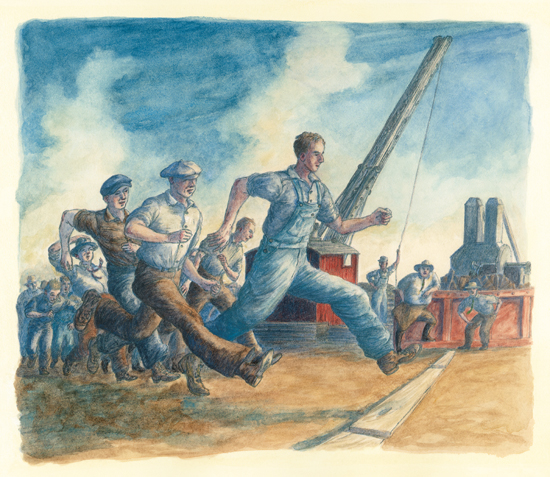 Some mornings, at the lumberyard where Grandpa sometimes worked, he had to run a footrace against other men like him. If he won, that meant he got to work that day. That meant hed won the right to sweat
Some mornings, at the lumberyard where Grandpa sometimes worked, he had to run a footrace against other men like him. If he won, that meant he got to work that day. That meant hed won the right to sweat  in the hot Texas sun, painting railroad ties with tar, hoisting them up when they were dry, for ten cents an hour. Low-paying work was better than no work at all.
in the hot Texas sun, painting railroad ties with tar, hoisting them up when they were dry, for ten cents an hour. Low-paying work was better than no work at all. 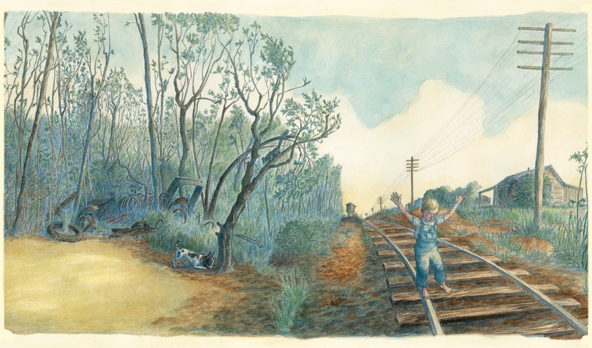 During those years, you spent your summers daydreaming, exploring the woods behind your house.
During those years, you spent your summers daydreaming, exploring the woods behind your house.
I wonder what you dreamed about.
Were you dreaming of a different world?
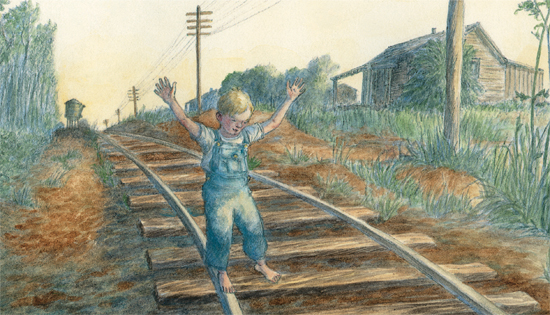 With no money for new shoes, your feet got tough as leather walking barefoot down the gravel roads,
With no money for new shoes, your feet got tough as leather walking barefoot down the gravel roads,
walking on the hot rails day after daythats what youve said. But youve also said you never went hungry. 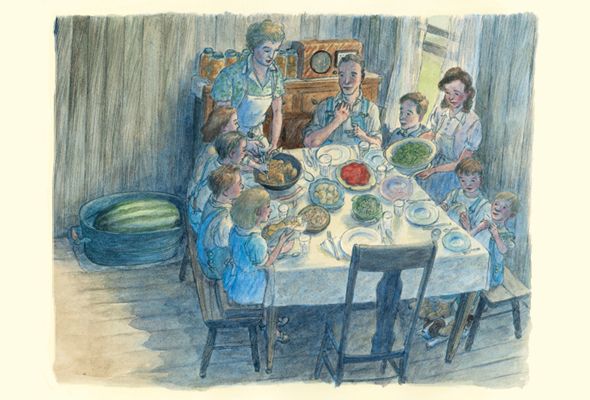 There were vegetables and fruit from the garden corn and okra, tomatoes, watermelons, peas and potatoes and collard greens.
There were vegetables and fruit from the garden corn and okra, tomatoes, watermelons, peas and potatoes and collard greens.
What you couldnt eat right away, your mom would store in Mason jars apples and peaches and pears, sealed until the winter.
And there were always eggs, and there was often chicken everyones favorite fried up in a cast-iron skillet. 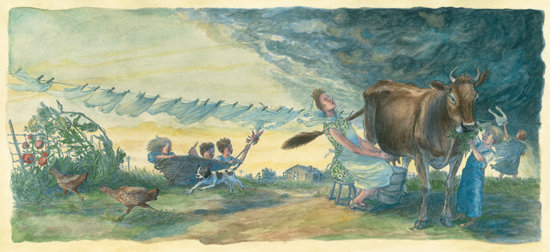 How hard Granny Winter must have worked, feeding so many people, especially with you and David and Harry and Lew and Ada and Oleta all too young to help.
How hard Granny Winter must have worked, feeding so many people, especially with you and David and Harry and Lew and Ada and Oleta all too young to help.
The way you describe her, Granny Winter did everythingcooking, cleaning, gardening, milking.
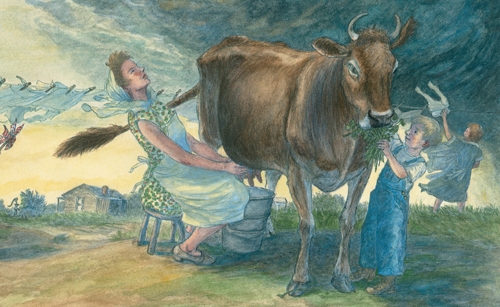 But even as strong and as tough as she was, she went a little crazy sometimes. Youve said that she was so afraid of storms,
But even as strong and as tough as she was, she went a little crazy sometimes. Youve said that she was so afraid of storms,
The way you describe her, Granny Winter did everythingcooking, cleaning, gardening, milking. 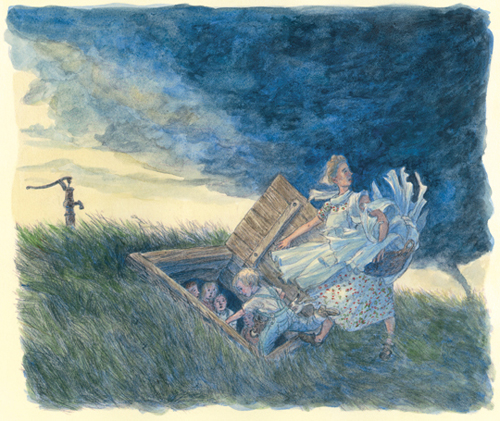 But even as strong and as tough as she was, she went a little crazy sometimes.
But even as strong and as tough as she was, she went a little crazy sometimes.
Youve said that she was so afraid of storms,
shed make you all go down in the storm cellar, where shed cry and pray, wailing, Oh Lord, were all gonna die! 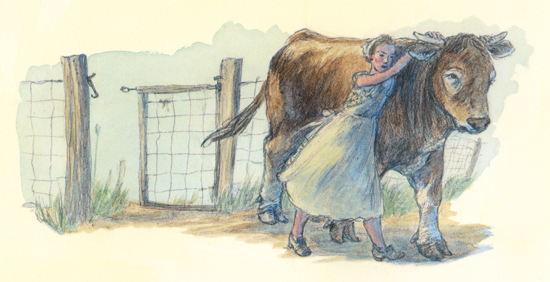 She wasnt scared of much else, though. Like the time a bull wandered into your pasture through an open gate she just grabbed it by its horns and led it out.
She wasnt scared of much else, though. Like the time a bull wandered into your pasture through an open gate she just grabbed it by its horns and led it out. 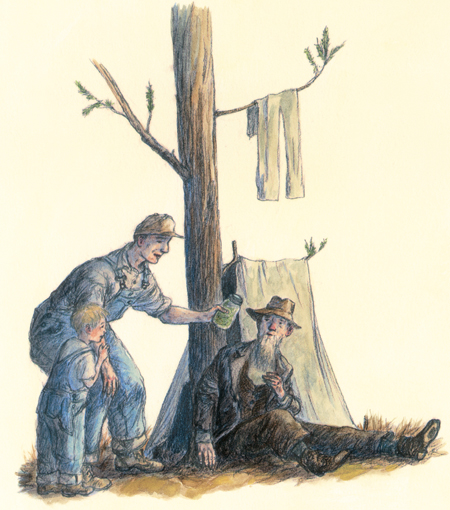 Sometimes its hard to believe this world was even real. Maybe Ive remembered it wrong.
Sometimes its hard to believe this world was even real. Maybe Ive remembered it wrong.
Did Grandpa Winter really know a hermit who lived in the woods and ate beans from a jar? 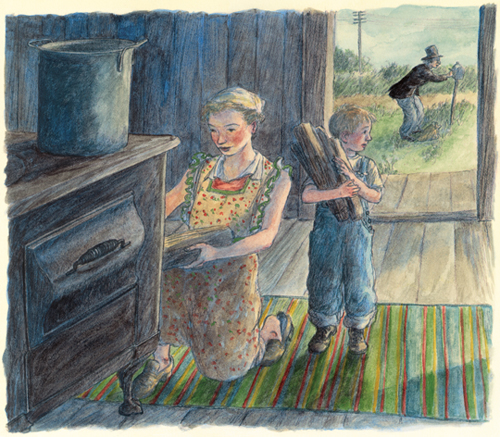


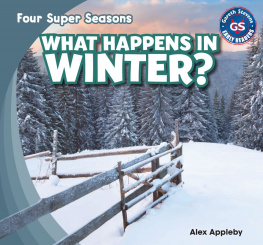


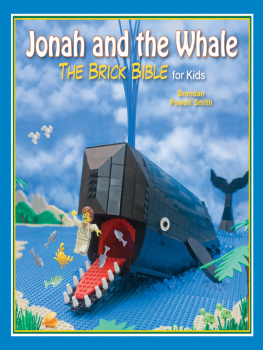

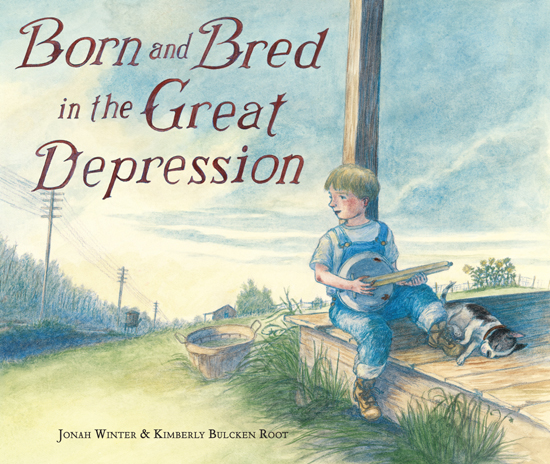
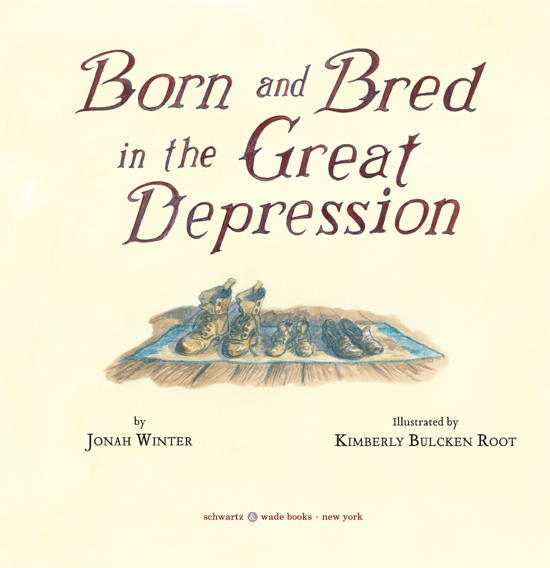
 Text copyright 2011 by Jonah Winter
Text copyright 2011 by Jonah Winter Where you grew up, on the edge of town, next to the tracks, you could hear the trains going by at night.
Where you grew up, on the edge of town, next to the tracks, you could hear the trains going by at night. In that tiny white frame house, there were ten of you eight kids and your parentsin four small rooms.
In that tiny white frame house, there were ten of you eight kids and your parentsin four small rooms. You got your water from a well because there was no indoor plumbing. There were no toilets, so you had to use an outhouse.
You got your water from a well because there was no indoor plumbing. There were no toilets, so you had to use an outhouse. I know, because youve told me, Dad. This was the world you grew up in.
I know, because youve told me, Dad. This was the world you grew up in.  There werent any jobs, or not many, and sometimes your dad, Grandpa Winter, couldnt find work. Hed make the slow walk home empty-handed, past the storefronts, over the bridge, all the way to the edge of town
There werent any jobs, or not many, and sometimes your dad, Grandpa Winter, couldnt find work. Hed make the slow walk home empty-handed, past the storefronts, over the bridge, all the way to the edge of town Some mornings, at the lumberyard where Grandpa sometimes worked, he had to run a footrace against other men like him. If he won, that meant he got to work that day. That meant hed won the right to sweat
Some mornings, at the lumberyard where Grandpa sometimes worked, he had to run a footrace against other men like him. If he won, that meant he got to work that day. That meant hed won the right to sweat  in the hot Texas sun, painting railroad ties with tar, hoisting them up when they were dry, for ten cents an hour. Low-paying work was better than no work at all.
in the hot Texas sun, painting railroad ties with tar, hoisting them up when they were dry, for ten cents an hour. Low-paying work was better than no work at all.  During those years, you spent your summers daydreaming, exploring the woods behind your house.
During those years, you spent your summers daydreaming, exploring the woods behind your house. With no money for new shoes, your feet got tough as leather walking barefoot down the gravel roads,
With no money for new shoes, your feet got tough as leather walking barefoot down the gravel roads, There were vegetables and fruit from the garden corn and okra, tomatoes, watermelons, peas and potatoes and collard greens.
There were vegetables and fruit from the garden corn and okra, tomatoes, watermelons, peas and potatoes and collard greens. How hard Granny Winter must have worked, feeding so many people, especially with you and David and Harry and Lew and Ada and Oleta all too young to help.
How hard Granny Winter must have worked, feeding so many people, especially with you and David and Harry and Lew and Ada and Oleta all too young to help. But even as strong and as tough as she was, she went a little crazy sometimes. Youve said that she was so afraid of storms,
But even as strong and as tough as she was, she went a little crazy sometimes. Youve said that she was so afraid of storms, But even as strong and as tough as she was, she went a little crazy sometimes.
But even as strong and as tough as she was, she went a little crazy sometimes. She wasnt scared of much else, though. Like the time a bull wandered into your pasture through an open gate she just grabbed it by its horns and led it out.
She wasnt scared of much else, though. Like the time a bull wandered into your pasture through an open gate she just grabbed it by its horns and led it out.  Sometimes its hard to believe this world was even real. Maybe Ive remembered it wrong.
Sometimes its hard to believe this world was even real. Maybe Ive remembered it wrong.